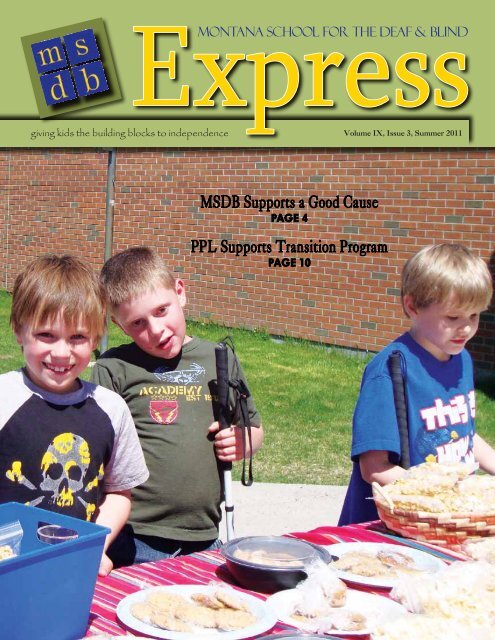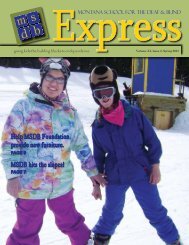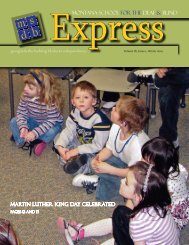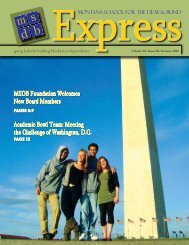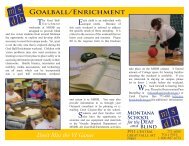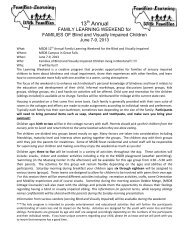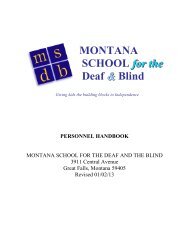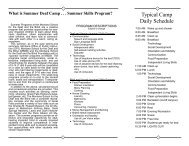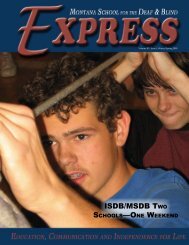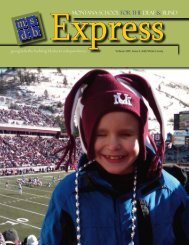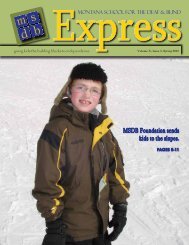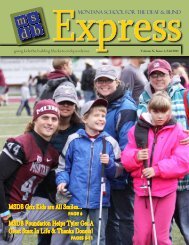Summer 2011 - Montana School for the Deaf & Blind
Summer 2011 - Montana School for the Deaf & Blind
Summer 2011 - Montana School for the Deaf & Blind
Create successful ePaper yourself
Turn your PDF publications into a flip-book with our unique Google optimized e-Paper software.
Express<br />
<strong>Montana</strong> <strong>School</strong> <strong>for</strong> <strong>the</strong> <strong>Deaf</strong> & BlinD<br />
giving kids <strong>the</strong> building blocks to independence<br />
Volume IX, Issue 3, <strong>Summer</strong> <strong>2011</strong><br />
MSDB Supports a Good Cause<br />
Page 4<br />
PPL Supports Transition Program<br />
Page 10
“Child First”<br />
Putting <strong>the</strong> Needs of Children First in <strong>the</strong> Individual Education Process<br />
steve gettel, MsdB superintendent<br />
Out of every thousand<br />
children only three<br />
or four are affected<br />
by hearing or vision<br />
loss. And because<br />
<strong>the</strong>re is little disability-specific training<br />
required in <strong>the</strong> preparation programs <strong>for</strong><br />
teachers or administrators in <strong>Montana</strong>,<br />
when an Individual Education Plan<br />
(IEP) is being developed, <strong>the</strong> members<br />
of many IEP teams just do not have<br />
<strong>the</strong> knowledge or skill to adequately<br />
assess <strong>the</strong> level of per<strong>for</strong>mance or <strong>the</strong><br />
educational needs of <strong>the</strong> child. That’s not<br />
to say that this is <strong>the</strong> case in every school district, but <strong>for</strong><br />
some children <strong>the</strong> teachers, administrators, and support<br />
specialists can be unskilled in assessing <strong>the</strong> language<br />
and communication of children with hearing loss. And<br />
<strong>the</strong>re are less than a half dozen public school teachers in<br />
<strong>the</strong> state trained to assess <strong>the</strong> print media, Braille and<br />
orientation and mobility needs of children with a vision loss<br />
Un<strong>for</strong>tunately, if an educational placement is made without<br />
good assessment in<strong>for</strong>mation and a clear understanding of<br />
a child’s instructional needs, <strong>the</strong>n <strong>the</strong> setting and services<br />
may not be appropriate and may not meet <strong>the</strong> terms of <strong>the</strong><br />
Individual with Disabilities Education Act (IDEA). IDEA<br />
requires <strong>the</strong> “least restrictive access” to communication<br />
or instruction <strong>for</strong> children who need a “Language Rich<br />
Environment” (LRE). In determining <strong>the</strong> least restrictive<br />
environment or LRE, <strong>the</strong> focus should not be on <strong>the</strong> type<br />
of educational setting but what happens in that setting.<br />
With <strong>the</strong> pending reauthorization of <strong>the</strong> Individuals<br />
with Disabilities Education Act, MSDB will be participating<br />
in <strong>the</strong> “Child First” project being championed by <strong>the</strong><br />
Conference of Educational Administrators of <strong>School</strong>s<br />
and Programs <strong>for</strong> <strong>the</strong> <strong>Deaf</strong> (CEASD), of which <strong>the</strong> school<br />
is a member. The CEASD is committed to <strong>the</strong> principle<br />
that <strong>the</strong> IEP and <strong>the</strong> Individualized Family Service Plan (IFSP)<br />
are central and fundamental to <strong>the</strong> IDEA. Every<br />
child with a disability is unique in his or her individual<br />
2 MSDB EXPRESS<br />
abilities, background, experiences and<br />
needs. CEASD and MSDB believe that<br />
<strong>the</strong> identification of <strong>the</strong> child’s needs and<br />
strengths should occur be<strong>for</strong>e <strong>the</strong> IEP is<br />
developed. And <strong>the</strong> development of <strong>the</strong> IEP<br />
should be based on those identified needs.<br />
Through <strong>the</strong> “Child First”<br />
project CEASD member schools are<br />
working to see that Congress recognizes<br />
<strong>the</strong> IEP as <strong>the</strong> centerpiece of IDEA and<br />
that through <strong>the</strong> IEP process:<br />
• The abilities and needs of <strong>the</strong><br />
child are identified and goals to meet<br />
those needs are developed be<strong>for</strong>e an<br />
educational placement is discussed.<br />
• The IEP is developed by a team that includes<br />
trained and qualified professionals who understand how<br />
<strong>the</strong> needs of children with vision or hearing loss can best be<br />
addressed in <strong>the</strong> school.<br />
• The team not only considers “special factors”<br />
but also ensures that <strong>the</strong>y are provided <strong>for</strong> in <strong>the</strong> IEP.<br />
These special factors include <strong>the</strong> child’s need <strong>for</strong> language<br />
acquisition, direct access to instruction through sign<br />
language or Braille, orientation and mobility instruction,<br />
access to <strong>the</strong> general curriculum as well as <strong>the</strong> core<br />
curriculum, meaningful measurements of academic progress<br />
with appropriate accommodations <strong>for</strong> testing designed to<br />
meet <strong>the</strong> needs of deaf and blind children, membership in<br />
a language community, and participation in after school<br />
programs.<br />
• The discussion of educational placement by <strong>the</strong><br />
IEP team must begin with a review of <strong>the</strong> full continuum of<br />
all options available to <strong>the</strong> student. This full continuum not<br />
only includes <strong>the</strong> placements available in <strong>the</strong> local school<br />
district but also <strong>the</strong> options available at special schools like<br />
MSDB.<br />
The changes that CEASD proposes will reaffirm <strong>the</strong><br />
emphasis on <strong>the</strong> child’s IEP as a vehicle <strong>for</strong> determining<br />
<strong>the</strong> educational environment conducive to maximizing <strong>the</strong><br />
development of <strong>the</strong> whole child and <strong>the</strong> achievement of<br />
educational outcomes.
MsdB student sPOtlight<br />
Scout’s Honor<br />
lori heyer, MsdB Parent<br />
On Saturday, February 26, <strong>2011</strong>, MSDB student<br />
Parker Wilkins received his Eagle Scout Award.<br />
This is <strong>the</strong> highest award achievable by a Boy<br />
Scout and is only given to Scouts who have earned a certain<br />
number of merit badges and completed an Eagle Scout<br />
Service Project. This is a commendable feat, as statistics<br />
show that only 2% of all Boy Scouts actually achieve <strong>the</strong><br />
rank of Eagle Scout.<br />
In May of 2010, Parker completed his service<br />
project. He and his fellow Scouts enlisted <strong>the</strong> help of o<strong>the</strong>r<br />
volunteers from <strong>the</strong><br />
Great Falls 1st Ward<br />
of <strong>the</strong> Church of Jesus<br />
Christ of Latter-Day<br />
Saints and from MSDB<br />
to dig holes <strong>for</strong> two<br />
red maple trees and a<br />
hole <strong>for</strong> a time capsule<br />
on <strong>the</strong> grounds of<br />
MSDB. A combined<br />
total of 41 man-hours<br />
were logged to plant<br />
<strong>the</strong> trees. Three days<br />
later, Parker and his<br />
Proud as a pecock, Parker Wilkins<br />
fellow students of<br />
poses with his eagle scout award.<br />
MSDB buried <strong>the</strong> time<br />
capsule flanked by <strong>the</strong> two trees. The time capsule was<br />
a coordinated project of <strong>the</strong> students and staff of MSDB<br />
under Parker’s direction. Parker’s grandfa<strong>the</strong>r, Robert<br />
Heyer of Missoula, built <strong>the</strong> time capsule, and <strong>the</strong> staff and<br />
students stuffed it full of memorabilia. The time capsule<br />
was placed inside a metal garbage can, donated by ACE<br />
Hardware of Great Falls, <strong>for</strong> protection from <strong>the</strong> elements.<br />
The trees will serve as markers to locate <strong>the</strong> capsule in <strong>the</strong><br />
future. The time capsule will be raised in <strong>the</strong> year 2025.<br />
Friends and family helped Parker celebrate his<br />
achievement at a <strong>for</strong>mal presentation at Parker’s church<br />
building on February 26. Congratulations Parker – we are<br />
proud of you!<br />
In thIs Issue<br />
Page 2<br />
• “Child First”<br />
Page 3<br />
• MSDB Student Spotlight: Scout’s Honor<br />
Page 4<br />
• Our “Grandma” is <strong>the</strong> Greatest<br />
• When Life Gives you Lemons...<br />
Page 5<br />
• Independence... Just A Step Ahead<br />
Page 6-7<br />
• Meet <strong>the</strong> <strong>2011</strong> Graduates<br />
Page 8<br />
• 4-H is Worth a Shot<br />
• Mastering <strong>the</strong> MSDB Greenhouse<br />
Page 9<br />
• MSDB Points <strong>the</strong> Way to Auditory Learning<br />
Page 10-11<br />
• PPL and MSDB Foundation Support<br />
Transition Program<br />
Page 12<br />
• Mr. Gettel Makes a Splash!<br />
• The Dictionary Project Comes to MSDB<br />
Page 13<br />
• Meet <strong>the</strong> Littlest Graduates<br />
• MSDB Helps Train Voc-Rehab Staff<br />
Page 14<br />
• Hearing Screenings Aid Athletes<br />
• Thank You, Mr. Harris<br />
Page 15<br />
• The Game of Life<br />
Page 16-17<br />
• MSDB Mash-Up!<br />
Page 18-19<br />
• MSDB-Leading <strong>the</strong> Way <strong>for</strong> <strong>Deaf</strong> & <strong>Blind</strong> Children<br />
Page 20<br />
• Social-Emotional Literacy in <strong>Deaf</strong> Children
Our “grandMa” is <strong>the</strong> greatest!<br />
Congratulations, grandma Cecelia, you<br />
deserve this award and so much more!<br />
When Life Gives You Lemons…<br />
amanda taylor, MsdB teacher<br />
At MSDB, we have adopted a saying from Alex’s Lemonade<br />
Stand Foundation <strong>for</strong> Childhood Cancer: “When life<br />
gives you lemons, make lemonade.” Alex Scott, who<br />
was diagnosed with pediatric cancer shortly be<strong>for</strong>e her first<br />
birthday, decided that she wanted to have a lemonade stand to<br />
raise money <strong>for</strong> <strong>the</strong> doctors that helped her, so <strong>the</strong>y could help<br />
o<strong>the</strong>r kids too. Later that year she opened her first lemonade<br />
stand. Since <strong>the</strong>n it has become a worldwide charity event<br />
and fund raiser. Students in Ms. Blake’s, Ms. Moog’s, Ms.<br />
Philipp’s and Ms. Taylor’s classes participated in Alex’s Virtual<br />
Lemonade Stand. It is a community service event in which<br />
students and schools around <strong>the</strong> world raise money <strong>for</strong> and<br />
awareness of pediatric cancer. Our principal let us know about<br />
<strong>the</strong> event, allowed our students to come up with <strong>the</strong>ir plan<br />
<strong>for</strong> <strong>the</strong> lemonade stand, and supported us throughout this<br />
learning process.<br />
Our students were motivated to raise money to help<br />
o<strong>the</strong>r children and immediately began planning <strong>for</strong> <strong>the</strong>ir<br />
lemonade stand. They helped create posters to advertise<br />
our event, set up <strong>for</strong> <strong>the</strong> event, make <strong>the</strong> lemonade, serve<br />
lemonade and baked goods, and collect donations <strong>for</strong><br />
<strong>the</strong>ir Alex’s Lemonade Stand. They were able to practice<br />
communicating with students and adults, counting money,<br />
serving people in our community, and sharing responsibilities.<br />
Each of <strong>the</strong>m verbalized <strong>the</strong>ir sense of accomplishment in <strong>the</strong><br />
4 MSDB EXPRESS<br />
leann goss, MsdB teacher<br />
On Saturday, May 14, Cecelia<br />
Eide was recognized <strong>for</strong> her<br />
dedication to <strong>the</strong> Foster<br />
Grandparent Program. She is pictured<br />
here, receiving <strong>the</strong> Presidential<br />
Award signed by President Obama<br />
in recognition <strong>for</strong> serving more than<br />
4000 hours in <strong>the</strong> Foster Grandparent<br />
Program. The award was presented<br />
to her by an airman from Malmstrom<br />
Air Force Base at a luncheon at <strong>the</strong><br />
Meadow Lark Country Club.<br />
Presently, “Grandma Cecelia”<br />
works with children in <strong>the</strong> <strong>Deaf</strong> and<br />
Hard of Hearing Department at<br />
MSDB. She has been working as a<br />
foster grandparent <strong>for</strong> 7 years. Her<br />
work has always involved helping <strong>the</strong><br />
preschoolers. This year she is with <strong>the</strong><br />
preschool class <strong>for</strong> part of <strong>the</strong> day and<br />
also works with <strong>the</strong> kindergarten/1st<br />
grade class <strong>for</strong> part of <strong>the</strong> day. She<br />
is patient and kind and always has<br />
a warm smile <strong>for</strong> everyone she<br />
meets! The children love her, and <strong>the</strong><br />
teachers rely on her assistance each<br />
and every day. She looks <strong>for</strong>ward to<br />
working more with preschool in <strong>the</strong><br />
future. She is a vital part of our daily<br />
program, and we are so proud of <strong>the</strong><br />
work she has done and grateful <strong>for</strong><br />
her tireless dedication and endless<br />
generosity!<br />
MsdB students and staff generously gave of <strong>the</strong>ir time<br />
and “piggy banks” at alex’s lemonade stand. donations<br />
went towards <strong>the</strong> battle against childhood cancer.<br />
hard work <strong>the</strong>y put <strong>for</strong>th and have already started planning <strong>for</strong><br />
next year’s lemonade stand.<br />
We feel a strong sense of pride that we were all able to<br />
come toge<strong>the</strong>r and help o<strong>the</strong>rs. We hope that this event has<br />
inspired our students, staff, and o<strong>the</strong>rs in <strong>the</strong> community to<br />
realize that one person – one kid – can make a difference!<br />
We hope to see you next year at our annual Alex’s Lemonade<br />
Stand.
Independence… Just a Step Ahead<br />
geri darko, Orientation and Mobility specialist<br />
The 2010-<strong>2011</strong> school year has flown by and students are<br />
showing great improvement in <strong>the</strong>ir independent travel<br />
skills. We’ve been working on many skills since school<br />
began and we continue to build on those skills to help students<br />
become more independent when traveling. As <strong>the</strong> wea<strong>the</strong>r<br />
warms up, this summer will be a great time <strong>for</strong> students to get<br />
out and pound <strong>the</strong> pavement to explore <strong>the</strong>ir neighborhoods<br />
and practice <strong>the</strong>ir orientation and mobility skills.<br />
Ask your child to explain <strong>the</strong> numbering system in Great<br />
Falls. These are <strong>the</strong> facts that help students plan routes to<br />
businesses around town. Here’s a little cheat sheet <strong>for</strong> you to<br />
check your child’s answers:<br />
• Streets run north and south; avenues run east and<br />
west.<br />
• Central Avenue divides <strong>the</strong> city into north and south.<br />
Avenue numbers get larger as you travel away from<br />
Central Avenue.<br />
• Park Drive is <strong>the</strong> dividing line between east and west.<br />
Street numbers get larger as you travel east or west<br />
from Park Drive.<br />
• The first numbers of an address tell which block <strong>the</strong><br />
building is on.<br />
• The last numbers of an address tell where <strong>the</strong> building<br />
is at on <strong>the</strong> block (at <strong>the</strong> beginning, in <strong>the</strong> middle, or at<br />
<strong>the</strong> end).<br />
• Odd number addresses are on <strong>the</strong> north side of <strong>the</strong><br />
avenue or on <strong>the</strong> east side of <strong>the</strong> street.<br />
• Even number addresses are on <strong>the</strong> south side of <strong>the</strong><br />
avenue or on <strong>the</strong> west side of <strong>the</strong> street.<br />
Independence is a large part of <strong>the</strong> vision at MSDB.<br />
Part of that independence develops when students learn how<br />
to plan trips to get a haircut, get <strong>the</strong>ir own groceries, visit<br />
a friend, or attend a social event independently. Here are<br />
some ways families can help students learn to become more<br />
independent when traveling:<br />
1. Encourage students to take <strong>the</strong>ir canes with <strong>the</strong>m<br />
each time <strong>the</strong>y leave <strong>the</strong>ir home. Remember, <strong>the</strong> cane is a<br />
necessary tool that helps your child stay safe and independent.<br />
If your child has a white cane, <strong>the</strong>y should carry it with <strong>the</strong>m<br />
at all times. Carrying it with <strong>the</strong>m ensures that it will be handy<br />
when a situation arises and a cane is needed <strong>for</strong> safety and<br />
independence. The white cane also identifies a person with a<br />
visual impairment.<br />
2. Use cardinal directions to describe where you are<br />
going as you leave your home and travel to familiar areas with<br />
your child.<br />
3. If your child does not live in Great Falls full time,<br />
help <strong>the</strong>m learn about <strong>the</strong> numbering system in his or her<br />
hometown.<br />
4. Ask students to help you plan <strong>the</strong> route from home to<br />
<strong>the</strong> store or a friend’s house.<br />
5. Allow children to lead <strong>the</strong> way as you walk through<br />
<strong>the</strong> grocery store or shopping mall. Give short “assignments” to<br />
your child and allow him or her to search <strong>for</strong> specific items on<br />
your shopping list or a specific store in <strong>the</strong> mall.<br />
6. Talk with your child about street safety and when he<br />
or she should cross <strong>the</strong> street. For a visually impaired person,<br />
<strong>the</strong> safest time to cross <strong>the</strong> street is during a lull in traffic or<br />
when <strong>the</strong> person hears a surge of parallel traffic going through<br />
<strong>the</strong> intersection. My students who use white canes should<br />
always have <strong>the</strong> cane in front of <strong>the</strong>m and visible to drivers at<br />
all street crossings.<br />
7. Inquire about your child’s orientation and mobility<br />
lessons. Ask questions about where he or she travels during<br />
<strong>the</strong>se lessons and what he or she is learning. Encourage<br />
your child to use <strong>the</strong>se skills, because practice will help <strong>the</strong>m<br />
become more independent when traveling.<br />
8. If you have questions about orientation and mobility,<br />
please contact me.<br />
MSDB EXPRESS 5
Meet <strong>the</strong> <strong>2011</strong> Graduates<br />
denise Philipp, MsdB teacher<br />
The <strong>Montana</strong> <strong>School</strong> <strong>for</strong> <strong>the</strong> <strong>Deaf</strong> & <strong>Blind</strong> honored five graduates on Saturday, May 21: Tray Cook (from Great<br />
Falls), Justin Farrington (from Butte), Erin Jessen (from Billings), Mat<strong>the</strong>w Lamb (from Great Falls) and Alex<br />
Wermling (from Great Falls). The rainy wea<strong>the</strong>r could not deter families, friends, and past MSDB graduates<br />
from joining in <strong>the</strong> celebration of <strong>the</strong> completion of <strong>the</strong>ir high school adventures. The ceremony included a speech<br />
from MSDB teacher and coach, Gary McManus, a PowerPoint presentation that highlighted <strong>the</strong> graduates’ lives,<br />
<strong>the</strong> bestowing of various awards and scholarships, <strong>the</strong> unveiling of <strong>the</strong> senior gifts to <strong>the</strong> school, and <strong>the</strong> actual<br />
commencement exercises and conferring of diplomas. We wish our seniors <strong>the</strong> best of luck in <strong>the</strong>ir future endeavors.<br />
Some are journeying on to college, and we will welcome back o<strong>the</strong>rs next fall into our transition program.<br />
6 MSDB EXPRESS<br />
erin niChOle Jessen<br />
Hello! My name is Erin Nichole Jessen. I have attended school at <strong>the</strong> <strong>Montana</strong> <strong>School</strong> <strong>for</strong><br />
<strong>the</strong> <strong>Deaf</strong> and <strong>Blind</strong> (MSDB) since I was in <strong>the</strong> 7th grade. My teacher’s name is Dessica<br />
Wilson; she is a great teacher. She is also one of <strong>the</strong> directors <strong>for</strong> our per<strong>for</strong>ming group,<br />
Expressions of Silence (EOS). I have had fun per<strong>for</strong>ming with EOS <strong>for</strong> six years. I also<br />
enjoy hanging out with my friends at <strong>the</strong> MSDB cottages. I will be thinking about all of<br />
<strong>the</strong> staff and students over <strong>the</strong> summer now that I have graduated. I am proud of my<br />
family <strong>for</strong> supporting me at MSDB. I plan to go back to MSDB as a transition student in<br />
<strong>the</strong> fall; I want to stay <strong>for</strong> one more year at school. Thank you all <strong>for</strong> helping me learn and<br />
become successful!
alex JaCOB WerMling<br />
• Interests/hobbies:<br />
Football, basketball, stock car<br />
racing, weight lifting.<br />
• Favorite memory about<br />
MSDB: Milk and Cookies and<br />
<strong>the</strong> Bison/Rustler rivalry in<br />
Bechard’s classroom.<br />
• Favorite high school<br />
accomplishment: Captain of<br />
<strong>the</strong> varsity football team.<br />
• What do you plan to do<br />
after you graduate: I’m<br />
attending MSU Bozeman in <strong>the</strong> fall. I’m pursuing a degree in<br />
Construction Engineering.<br />
• Something inspirational you would like to tell<br />
o<strong>the</strong>rs: Never let life become boring.<br />
(Alex attended GFPS full time and MSDB <strong>for</strong> preschool and<br />
kindergarten)<br />
Justin ryne FarringtOn<br />
• Interests/hobbies: Music<br />
production and guitar repair<br />
• What will you miss about<br />
MSDB: McManus’ gym class<br />
• Favorite thing about<br />
MSDB: <strong>the</strong> friends and staff<br />
• What do you plan to do<br />
after you graduate: work<br />
and college<br />
• Something inspirational<br />
you would like to tell<br />
o<strong>the</strong>rs: Pain is weakness<br />
leaving <strong>the</strong> body.<br />
Mat<strong>the</strong>W steven laMB<br />
• Interests/hobbies:<br />
swimming, riding ATV’s,<br />
hiking<br />
• Favorite thing about<br />
MSDB: Being surrounded<br />
by people who accept me <strong>for</strong><br />
who I am and <strong>the</strong> one-to-one<br />
contact with students and staff.<br />
• What will you miss<br />
about MSDB: Being in an<br />
environment that is loving and<br />
accepting.<br />
• What do you plan to do after you graduate: Come back<br />
to MSDB <strong>for</strong> post high school program.<br />
• Something inspirational you would like to tell<br />
o<strong>the</strong>rs: Everyone has strengths and weakness, focus on <strong>the</strong><br />
strengths and see how far you can go.<br />
tray JaMes COOk<br />
• Interests/hobbies:<br />
Technology, and I like to play<br />
videogames.<br />
• Favorite thing about<br />
MSDB: Prom of 2010.<br />
• What will you miss about<br />
MSDB: I will definitely miss<br />
all my friends.<br />
• What do you plan to do<br />
after you graduate: I plan<br />
to go to college, and pursue<br />
a career as VI technology<br />
teacher, and an entrepreneur.<br />
• Favorite Quote: “Attitude + Ambition = Achievement”<br />
MSDB EXPRESS 7
Mastering <strong>the</strong> MsdB greenhOuse<br />
8 MSDB EXPRESS<br />
4-h is Worth a shot<br />
a flag. This flag will be displayed at <strong>the</strong><br />
Maeona k. lee, supervising<br />
Counselor and dorothy nutter,<br />
fair along with some of <strong>the</strong> projects <strong>the</strong><br />
lead houseparent<br />
students have worked on. Several of <strong>the</strong><br />
One of <strong>the</strong> newest clubs<br />
that was introduced to <strong>the</strong><br />
residential students this year<br />
students also made posters depicting<br />
what <strong>the</strong>y did this year. Even though<br />
<strong>the</strong> students will be in <strong>the</strong>ir hometowns<br />
was 4-H. The students who got parental<br />
when <strong>the</strong> Great Falls fair is in session,<br />
permission to participate in 4-H this<br />
<strong>the</strong>ir 4-H items will be displayed <strong>the</strong>re<br />
year were involved in several projects,<br />
and ribbons can still be awarded. The<br />
including photography, riflemanship<br />
students also worked on a booklet to<br />
and archery. They also participated in<br />
record what <strong>the</strong>y have learned, and<br />
gardening. The students in riflemanship<br />
throughout <strong>the</strong> school year, <strong>the</strong> 4-H<br />
and archery attended a class each week<br />
students from MSDB could attend off<br />
to learn <strong>the</strong> rules of <strong>the</strong>se sports and<br />
campus group activities along with<br />
to practice honing <strong>the</strong>ir skills. Those<br />
two classes were taught by volunteers<br />
Juan takes aim at a target during<br />
archery practice.<br />
o<strong>the</strong>r 4-H clubs in Great Falls. Dorothy<br />
Nutter, a Lead Houseparent, was <strong>the</strong><br />
who have experience in <strong>the</strong> sports. Safety is practiced at all main 4-H Leader. Maeona Lee, Supervising Counselor,<br />
times during <strong>the</strong>se sessions. Those students who were in helped with <strong>the</strong> group as well. Students appeared to enjoy<br />
photography learned techniques such as how to take a good participating and were excited about <strong>the</strong>ir MSDB 4-H Club.<br />
picture, whe<strong>the</strong>r it is of scenery, animals, people, etc. The<br />
If you have any questions about ei<strong>the</strong>r of <strong>the</strong> articles<br />
staff in <strong>the</strong> residential program worked with <strong>the</strong> students in on this page, please feel to contact us. Maeona K. Lee,<br />
this photography group, assisting <strong>the</strong>m in making an album of Supervising Counselor, at 771 – 6116, mlee@msdb.mt.gov<br />
<strong>the</strong>ir pictures.<br />
or Dorothy Nutter, Geyser Lead Houseparent, at dnutter@<br />
Since starting <strong>the</strong> 4-H club <strong>the</strong> group has also designed msdb.mt.gov.<br />
Maeona k. lee, supervising Counselor<br />
and dorothy nutter, lead houseparent<br />
<strong>the</strong> Residential students were involved in ano<strong>the</strong>r new<br />
adventure this school year. It was gardening, which<br />
included going to gardening classes, working in our<br />
MSDB greenhouse, visiting a greenhouse out of town, and<br />
showcasing <strong>the</strong>ir plants. Yes, <strong>the</strong> MSDB greenhouse was<br />
back in use! The Residential students worked toge<strong>the</strong>r with<br />
volunteers from <strong>the</strong> Master Gardening program here in Great<br />
Falls as well as MSDB’s Residential staff. They cleaned up<br />
<strong>the</strong> greenhouse, assisted in any repairs it needed, planted<br />
<strong>the</strong>ir seeds, took care of <strong>the</strong> plants on a rotating schedule and<br />
eventually took <strong>the</strong>ir plants home with <strong>the</strong>m at <strong>the</strong> end of <strong>the</strong><br />
school year.<br />
The gardening class, which was also open to <strong>the</strong><br />
public, was taught by a local Master Gardener, Bob Ford,<br />
and continued until <strong>the</strong> end of May. The students especially<br />
enjoyed <strong>the</strong> last class, as it involved live snakes. The local<br />
ACE Hardware store donated <strong>the</strong> items needed to get <strong>the</strong><br />
greenhouse up and running, including seeds, and o<strong>the</strong>r local<br />
Master Gardeners helped <strong>the</strong> students with <strong>the</strong>ir gardening.<br />
The Master Gardeners were excited to be a part of <strong>the</strong><br />
MSDB greenhouse project and hope this was a great learning<br />
experience <strong>for</strong> <strong>the</strong> students. Maeona Lee, Supervising<br />
Counselor, and Dorothy Nutter, <strong>the</strong> Lead Houseparent in<br />
<strong>the</strong> Geyser cottage, worked toge<strong>the</strong>r to support this new<br />
adventure. We’re happy to report we had some “green<br />
thumb” success!
kitty and<br />
Jessica<br />
make<br />
cookies.<br />
kitty griffin, Outreach Consultant<br />
tiPs tO MaxiMiZe auditOry learning<br />
*Provide auditory in<strong>for</strong>mation first<br />
* Everyday activities provide <strong>the</strong> perfect “connection”<br />
to get children listening to meaningful in<strong>for</strong>mation<br />
*Take advantage of <strong>the</strong> nature of games. They<br />
provide opportunities <strong>for</strong> taking turns, asking questions, answering<br />
questions, and listening to <strong>the</strong> turns of o<strong>the</strong>rs.<br />
*Remember <strong>the</strong> adage “Garbage in-Garbage out.” Use natural speech<br />
patterns and appropriate prosody in your language model.<br />
*Number 1 rule <strong>for</strong> auditory learning: Make it Fun!<br />
MSDB POINTS THE WAY TO AUDITORY LEARNING<br />
many people with hearing loss.<br />
Technology in all aspects changes constantly. I felt <strong>the</strong><br />
effects of new technology very painfully when my trusty<br />
computer system failed. All components had to be<br />
replaced so that <strong>the</strong>y could “communicate” with one<br />
Auditory-Verbal Therapy teaches people using <strong>the</strong>se<br />
devices to understand speech and to learn to speak. MSDB<br />
is pointing <strong>the</strong> way to better hearing and keeping pace with<br />
technology by sharing <strong>the</strong> latest in<strong>for</strong>mation about this<br />
ano<strong>the</strong>r. That meant I had to learn a lot of things over again. approach at its Family Learning Weekend slated <strong>for</strong> June 10-12.<br />
Similarly, amplification<br />
Mary Koch Cline, a nationally<br />
equipment <strong>for</strong> better hearing<br />
regarded Certified Auditory<br />
is changing at a very rapid<br />
–Verbal Therapist (AVT), will<br />
pace. The use of devices to<br />
be presenting in<strong>for</strong>mation <strong>for</strong><br />
help people hear better has a<br />
families with children who are<br />
long history. One of <strong>the</strong> great<br />
learning via auditory methods.<br />
pioneers <strong>for</strong> better hearing<br />
MSDB has also provided<br />
was Helen Beebe. Back in <strong>the</strong><br />
continuing education on<br />
1940’s, Beebe’s first client was<br />
Auditory-Visual learning<br />
Mardie. She wore a body style<br />
to Outreach Consultants,<br />
hearing aid weighing about<br />
including webinars such as<br />
two pounds. Be<strong>for</strong>e <strong>the</strong> advent<br />
SMART EARs. To learn more<br />
of even this new technology,<br />
about auditory learning, you<br />
Beebe was recorded helping<br />
may access listening sites such<br />
children hear better by<br />
Jessica plays <strong>the</strong> fiddle.<br />
as www.advancedbionics.com,<br />
speaking into a kitchen funnel<br />
and www.cochlear.com. Look<br />
connected to flexible tubing. She continued her work in making <strong>for</strong> reputable sites including those of large organizations such as<br />
<strong>the</strong> most of <strong>the</strong> children’s residual hearing throughout her life. ASHA (American Speech Language and Hearing Association)<br />
Some of <strong>the</strong> newest technology has to do with digital at www.asha.org and <strong>the</strong> A.G. Bell Association <strong>for</strong> <strong>the</strong> <strong>Deaf</strong>, at<br />
hearing aids, implantable middle ear and brainstem devices www.agbell.org and <strong>the</strong> Listening Room www.hearingjourney.<br />
and <strong>the</strong> ever changing technology surrounding cochlear<br />
com/listening.<br />
implants. Cochlear implants were approved <strong>for</strong> use in adults in MSDB is devoted to providing this in<strong>for</strong>mation to<br />
1985 and were not approved <strong>for</strong> use in children until 1990. At families and continuing to be <strong>the</strong> leader in <strong>the</strong> education<br />
that time, a CI had one electrode, offering <strong>the</strong> simple choice of <strong>for</strong> children who are deaf, hard of hearing and/or visually<br />
“sound on” or “sound off!” Today, up to 24 electrodes are placed impaired. We promise to keep you posted on what’s new to help<br />
and precision mapping techniques offer children and adults a you navigate <strong>the</strong> challenging, changing world of technology <strong>for</strong><br />
wide range of frequencies. Spoken language is now accessible to deaf and hard of hearing students.<br />
MSDB EXPRESS 9
“Alone we can<br />
do so little;<br />
toge<strong>the</strong>r we can<br />
do so much.”<br />
~Helen Keller<br />
The MSDB Foundation is<br />
committed to funding academic<br />
and extracurricular activities<br />
that help prepare students <strong>for</strong><br />
independent lives. Please join us in<br />
that commitment by making a tax-<br />
deductible donation to<br />
www.justgive.org.<br />
OR MAIL YOUR<br />
CONTRIBUTION TO:<br />
MSDB Foundation<br />
P. O. Box 6576<br />
Great Falls, MT 59406<br />
For more in<strong>for</strong>mation,<br />
please call 406-771-6040<br />
10 MSDB EXPRESS<br />
<strong>Montana</strong> <strong>School</strong> <strong>for</strong> <strong>the</strong><br />
help us give kids <strong>the</strong> build<br />
india learns budgeting skills.<br />
PPL and MSDB Foundation<br />
Support Transition Program<br />
After graduating from high school in Livingston, India Hayes<br />
spent <strong>the</strong> 2010-11 school year at MSDB as a Transition student,<br />
learning how to live independently and taking <strong>the</strong> next steps<br />
toward meeting her educational and career goals. She plans to<br />
become a veterinary technician and is currently working at <strong>the</strong> Prime<br />
Cut restaurant while deciding where to attend college.<br />
India and <strong>the</strong> o<strong>the</strong>rs, including recent MSDB graduates, who<br />
joined her in <strong>the</strong> Transition Program during <strong>the</strong> past school year<br />
benefitted from funding from a valuable partnership between <strong>the</strong><br />
MSDB Foundation and PPL <strong>Montana</strong>. PPL contributed $6300 <strong>for</strong> <strong>the</strong>
<strong>Deaf</strong> & <strong>Blind</strong> Foundation<br />
ing blocks to independence<br />
Transition Program, which<br />
is one of many MSDB<br />
programs <strong>the</strong>y have supported<br />
since 2006.<br />
The highly<br />
individualized Transition<br />
Program uses academics, lifeskill<br />
building, and job coaching<br />
to help students prepare <strong>for</strong><br />
college or <strong>the</strong> work world.<br />
Each student works to gain<br />
<strong>the</strong> particular skills <strong>the</strong>y need<br />
to meet <strong>the</strong>ir post-high school<br />
goals. Through cooperative<br />
arrangements with local<br />
businesses that give students<br />
employment opportunities,<br />
India and her classmates<br />
worked at jobs in Great Falls<br />
while living in “apartments”<br />
on campus and learning to<br />
manage <strong>the</strong>ir financial lives.<br />
Young people with<br />
hearing or vision loss need<br />
extra help in achieving<br />
independence, and <strong>the</strong><br />
unemployment rate among<br />
deaf and blind people is<br />
extremely high. MSDB is<br />
preparing its students to meet<br />
<strong>the</strong> challenges that await <strong>the</strong>m<br />
in life beyond school, and <strong>the</strong><br />
MSDB Foundation and PPL<br />
<strong>Montana</strong> are happy to be part<br />
of that important ef<strong>for</strong>t.<br />
aBOve:<br />
lakendra<br />
on <strong>the</strong> job<br />
at kranz<br />
Flowers and<br />
gifts.<br />
leFt: india<br />
works in <strong>the</strong><br />
kitchen at<br />
Prime Cut.<br />
MSDB EXPRESS 11
Mr. gettel Makes a splash!<br />
yvette smail, Behavior specialist<br />
<strong>the</strong> latest 20/20 reading challenge celebration took place on<br />
May 17th and was a tremendous success. The celebration<br />
recognized <strong>the</strong> students who met <strong>the</strong> goal of at least 20<br />
minutes of reading on 20 days out of each month, from January<br />
through April. Students keep track of <strong>the</strong>ir reading time using <strong>the</strong>ir<br />
monthly reading calendars, with supervision by parents at home,<br />
house parents in <strong>the</strong> cottage, or by school staff. The kids who met<br />
<strong>the</strong> reading goals got <strong>the</strong> opportunity to dunk Superintendent<br />
Steve Gettel in a dunking booth. Several of our students rose to<br />
<strong>the</strong> occasion and were very excited at <strong>the</strong> opportunity to dunk Mr.<br />
Gettel. It was a beautiful warm day, but <strong>the</strong> same doesn’t hold true<br />
<strong>for</strong> <strong>the</strong> water that was in <strong>the</strong> tank! After <strong>the</strong> reading calendar group<br />
were finished dunking, <strong>the</strong> adults were also given <strong>the</strong> opportunity<br />
to dunk Mr. Gettel by donating $10 or more to our MSDB<br />
Foundation. Needless to say, many adults enjoyed donating money<br />
to <strong>the</strong> Foundation and keeping Mr. Gettel in <strong>the</strong> water!<br />
The celebration was successful as a motivator to get our<br />
students reading regularly, and beyond <strong>the</strong> dunking, it included<br />
a broad range of fun activities <strong>for</strong> all of <strong>the</strong> students, in order to<br />
continue to rein<strong>for</strong>ce <strong>the</strong> importance of reading. All students were<br />
able to participate in activities such as sidewalk drawing, <strong>the</strong> bean<br />
bag toss, and basketball. They enjoyed lemonade and popcorn<br />
donated by <strong>the</strong> Junior and Senior classes. There was a catch to<br />
all of this fun – having to pay <strong>for</strong> <strong>the</strong>se activities with stickers.<br />
The stickers were given to students who were “caught” using sign<br />
language consistently, but if a staff member or student were caught<br />
not signing, <strong>the</strong> person that caught <strong>the</strong>m got to take a sticker from<br />
<strong>the</strong>m. Students and staff from <strong>the</strong> visually impaired department<br />
were given stickers <strong>for</strong> good and consistent usage of <strong>the</strong> technology<br />
available to <strong>the</strong>m. It was truly a fun way to encourage students and<br />
staff to use sign language and technology to fur<strong>the</strong>r <strong>the</strong>ir successes,<br />
while celebrating <strong>the</strong> value of reading.<br />
12 MSDB EXPRESS<br />
The Dictionary Project<br />
Comes to MSDB<br />
shelley garretson, interpreter<br />
The Dictionary Project is a national nonprofit<br />
organization with <strong>the</strong> goal of providing every<br />
third-grade student in <strong>the</strong> United States with<br />
a dictionary. This project was founded in South<br />
Carolina in 1995, and <strong>the</strong> Great Falls Rotary<br />
Club has been involved with this program <strong>for</strong><br />
six years now. By doing this, <strong>the</strong> project hopes<br />
“to have a positive impact on education in this<br />
country and empower children to become skillful<br />
communicators and resourceful leaders.” The Great<br />
Falls Rotary Club delivers approximately 1,500<br />
dictionaries to 54 schools in Great Falls and <strong>the</strong><br />
surrounding areas.<br />
The Dictionary Project focuses on third<br />
graders because most schools teach dictionary skills<br />
in <strong>the</strong> third grade, and children of this age are also<br />
just beginning to make <strong>the</strong> transition from learning<br />
to read to reading to learn.<br />
The Dictionary Project firmly believes<br />
that children need a dictionary to accomplish<br />
<strong>the</strong>ir schoolwork in a proper fashion and become<br />
effective users of <strong>the</strong> English language. As part of<br />
<strong>the</strong> bigger picture, <strong>the</strong> organization also believes<br />
that literacy is crucial to <strong>the</strong> economic success and<br />
prosperity of <strong>the</strong> country.<br />
We thank Mrs. denise gray <strong>for</strong> presenting<br />
our third graders and <strong>the</strong>ir teachers with<br />
dictionaries on February 25.
Meet <strong>the</strong> Littlest Graduates<br />
leann goss and denise Philipp, MsdB teachers<br />
MSDB’s Preschool Graduation ceremony was held on May 19. Teachers Leann Goss and Denise Philipp<br />
presented preschool diplomas to two very special graduates, Hayden from <strong>the</strong> <strong>Deaf</strong> and Hard of<br />
Hearing Department and Davi Jean from <strong>the</strong> Visually Impaired Department. They have both been with our<br />
programs since <strong>the</strong>y were about 18 months old! Thanks to a lot of hard work and <strong>the</strong> families’ commitments<br />
to <strong>the</strong> programs, both children are more than ready to meet <strong>the</strong> challenges of Kindergarten next year! We are<br />
all so very proud of Hayden and Davi Jean and know <strong>the</strong>y have <strong>the</strong> foundation that <strong>the</strong>y need to continue to be<br />
successful students and friends to o<strong>the</strong>rs.<br />
davi Jean<br />
Your interests/hobbies: Laundry, cooking, play with my<br />
dog (Zeus)<br />
Favorite thing<br />
about MSDB:<br />
Arts and crafts and<br />
projects<br />
What do you<br />
like to learn in<br />
school: I like to<br />
learn everything.<br />
What do you<br />
plan to do after you graduate (<strong>for</strong> <strong>the</strong> summer): I’m<br />
going to go camping at Seeley Lake when it is warm. I’m<br />
going to spend 2 nights at my Aunt Wendy’s house.<br />
Something you would like to tell o<strong>the</strong>rs about you: I<br />
love going to gymnastics.<br />
MSDB Helps Train<br />
Voc-Rehab Staff<br />
sarah eyer, Outreach Consultant<br />
In May, <strong>the</strong> <strong>Montana</strong> Vocational Rehabilitation staff met <strong>for</strong><br />
<strong>the</strong>ir yearly training in Butte. A number of organizations<br />
and agencies collaborated on a presentation on serving<br />
<strong>Montana</strong>’s deaf and hard of hearing population. Staff raptly<br />
listened to each of <strong>the</strong> presenters and gave rave reviews. Bob<br />
Ellesch, Vocational Rehabilitation Counselor, spoke about <strong>the</strong><br />
role of a deaf counselor and gave some historical background<br />
on serving d/hh graduates. Current President of <strong>the</strong> <strong>Montana</strong><br />
Association of <strong>the</strong> <strong>Deaf</strong>, Char Harasymczuk spoke about deaf<br />
culture and shared valuable in<strong>for</strong>mation related to serving d/hh<br />
hayden<br />
Your interests/hobbies: I like to write with chalk and ride<br />
my “Cars” bike.<br />
Favorite thing<br />
about MSDB:<br />
Playtime with my<br />
friends!<br />
What do you<br />
like to learn in<br />
school: Reading<br />
books<br />
What do you<br />
plan to do after you graduate (<strong>for</strong> <strong>the</strong> summer): Play<br />
in <strong>the</strong> dirt with Grandma and Grandpa with my new pink<br />
bucket and blue shovel!<br />
Something you would like to tell o<strong>the</strong>rs about you: My<br />
school has a swimming pool!<br />
consumers. Adan Burke, from <strong>the</strong> CSD-Z telecommunications<br />
company out of Minneapolis, demonstrated video remote<br />
interpreting. Sarah Eyer, MSDB Outreach consultant, spoke<br />
about post-high school transition and what counselors can do<br />
to assist <strong>the</strong>ir deaf and hard of hearing clients in high school<br />
and beyond. Sarah stressed collaboration with o<strong>the</strong>r agencies<br />
and parents, as well as providing in<strong>for</strong>mation on <strong>the</strong> myriad<br />
Transition Services and supports available from MSDB. Susan<br />
Sperry from <strong>the</strong> <strong>Montana</strong> Telecommunications Access Program<br />
(MTAP) spoke about being late deafened and <strong>the</strong> impacts that<br />
has on a person’s life. Connie Hiett, also from MTAP, spoke<br />
about raising a deaf daughter and how VR has assisted her in<br />
helping her daughter achieve her goal of attending Gallaudet<br />
University. Dr. Kathy Laurin and Leslie Mullette from<br />
MonTech joined Connie Phelps of MTAP in presenting about<br />
hearing loss, hearing aids and assistive listening devices. The<br />
training was well attended and enjoyed by all.<br />
MSDB EXPRESS 13
Hearing Screenings Aid Athletes<br />
kathy Johnson, audiologist<br />
Many years ago, <strong>the</strong> founder of Special Olympics, Eunice<br />
Kennedy Shriver, was checking on her sister Rosemary<br />
Kennedy. Rosemary was developmentally disabled<br />
and lived in a group home in ano<strong>the</strong>r state. Mrs. Shriver was<br />
shocked to find out that Rosemary had several health problems<br />
that had not been dealt with. Since her sister’s physicians<br />
were not always treating her health problems, Mrs. Shriver<br />
wondered what was happening with<br />
o<strong>the</strong>r developmentally disabled<br />
adults in <strong>the</strong> US.<br />
Special Olympics <strong>the</strong>n<br />
launched <strong>the</strong> Healthy Athletes<br />
movement, which is dedicated<br />
to providing health screening<br />
in several areas to help monitor<br />
<strong>the</strong> health status of developmentally disabled children and<br />
adults. What <strong>the</strong>y found was disheartening. Even though<br />
most of <strong>the</strong>se athletes qualify <strong>for</strong> help with <strong>the</strong>ir medical care<br />
through Medicaid or o<strong>the</strong>r programs, significant numbers of<br />
<strong>the</strong> athletes were found to have eye problems, foot problems,<br />
dental problems, hearing problems, and o<strong>the</strong>r significant<br />
issues. It would seem that although <strong>the</strong>y could pay <strong>for</strong> care,<br />
<strong>the</strong>y weren’t getting it.<br />
Matt hansen of sidney, <strong>Montana</strong>,<br />
won <strong>the</strong> richland County spelling Bee<br />
<strong>for</strong> second graders.<br />
Congrats Matt ~ we are so proud of you!<br />
(Photo courtesy of <strong>the</strong> Sidney Herald)<br />
14 MSDB EXPRESS<br />
This occurs more often in <strong>the</strong> adult athletes, especially<br />
those living in group homes or by <strong>the</strong>mselves, ra<strong>the</strong>r than<br />
in <strong>the</strong> children who were living at home with <strong>the</strong>ir parents.<br />
Studies showed that not only were special needs people less<br />
likely to get taken to <strong>the</strong> doctor, <strong>the</strong> physicians were also less<br />
likely to treat problems with <strong>the</strong> developmentally disabled. It<br />
would seem that when families make <strong>the</strong> transition to adult<br />
services from <strong>the</strong> family pediatrician who has cared <strong>for</strong> <strong>the</strong>ir<br />
child since birth, and <strong>the</strong> transition to a group home from <strong>the</strong><br />
family home, <strong>the</strong>re is a gap in <strong>the</strong> medical care received by <strong>the</strong>ir<br />
disabled family member.<br />
Healthy Athletes programs are attempting to bridge<br />
this gap by identifying athletes that need help and identifying<br />
people in <strong>the</strong>ir communities who can give that help.<br />
This year, Healthy Hearing <strong>Montana</strong> screened approx.<br />
200 <strong>Montana</strong> Special Olympics athletes, and we found 10 that<br />
needed immediate medical care <strong>for</strong> <strong>the</strong>ir ears. In addition,<br />
about half <strong>the</strong> athletes had wax problems or o<strong>the</strong>r more minor<br />
problems with <strong>the</strong>ir ears.<br />
We hope that by identifying <strong>the</strong> need, someone in <strong>the</strong><br />
athletes’ home communities will ensure that <strong>the</strong>y get <strong>the</strong> care<br />
<strong>the</strong>y need to live healthy lives. Also, we have a lot of fun!<br />
For more in<strong>for</strong>mation on Healthy Hearing <strong>Montana</strong><br />
please visit: www.specialolympics.org/Healthy_Athletes<br />
Thank You, Mr. Harris<br />
emily lasalle, Outreach Consultant<br />
Congratulations to Tim Harris, <strong>the</strong> Director of Special Education<br />
<strong>for</strong> <strong>the</strong> State of <strong>Montana</strong>, on his upcoming retirement. Tim has<br />
been in <strong>the</strong> special education and o<strong>the</strong>r disability related fields<br />
<strong>for</strong> over 30 years. His job titles have varied<br />
– a Regional Services Coordinator, a Co-op<br />
director, an assistant director of an independent<br />
living center, a special education monitor <strong>for</strong><br />
OPI, <strong>the</strong> Early Assistance Program manager<br />
and <strong>the</strong>n state director. His goal has always<br />
been to improve services in <strong>the</strong> education <strong>for</strong><br />
students with special needs, including working<br />
with parents and schools to improve <strong>the</strong>ir<br />
relationships. Mr. Harris has been a friend to <strong>the</strong><br />
<strong>Montana</strong> <strong>School</strong> <strong>for</strong> <strong>the</strong> <strong>Deaf</strong> & <strong>Blind</strong> <strong>for</strong> many<br />
years. We, <strong>the</strong> staff and students at MSDB, thank you, Tim, <strong>for</strong> <strong>the</strong> many<br />
ways you have helped us. We appreciate your advocacy <strong>for</strong> our program.<br />
Enjoy <strong>the</strong> future; bask in your new position as full time Grandpa!
THE GAME OF LIFE<br />
a budget to purchase <strong>the</strong> items on <strong>the</strong> list, comparison<br />
richard aguon, lead Cottage houseparent<br />
Here in Obsidian Cottage high school students<br />
are continuing <strong>the</strong> process of learning to live<br />
independently. The students started<br />
playing “The Game of Life,” which will assist<br />
<strong>the</strong>m in handling <strong>the</strong>ir finances when <strong>the</strong>y<br />
venture out into living on <strong>the</strong>ir own. They<br />
are learning how to manage <strong>the</strong>ir money<br />
by depositing checks, balancing checking<br />
accounts, paying bills, and learning how<br />
to maintain a budget. The game will also<br />
help <strong>the</strong>m to identify <strong>the</strong>ir needs and wants<br />
and to experience delayed gratification by<br />
avoiding impulse buying in order to save<br />
<strong>the</strong>ir money <strong>for</strong> something.<br />
The students are learning how<br />
to manage <strong>the</strong>ir time <strong>for</strong> schoolwork,<br />
social activities, cooking, shopping, and<br />
extracurricular activities. They’re learning all <strong>the</strong> steps <strong>for</strong><br />
planning and making dinner: planning a menu, determining<br />
what food items <strong>the</strong>y need to shop <strong>for</strong>, making a shopping<br />
list, shopping <strong>for</strong> <strong>the</strong> items on that list, staying within<br />
shopping with <strong>the</strong> help of <strong>the</strong> newspaper, and <strong>the</strong> different<br />
methods of preparing a full course dinner and how to use <strong>the</strong><br />
kitchen appliances.<br />
Many additional life skills are increasing<br />
<strong>the</strong> students’ independence. Properly<br />
caring <strong>for</strong> <strong>the</strong>ir clo<strong>the</strong>s, including doing<br />
laundry, and dressing appropriately <strong>for</strong><br />
work, as well as school and social functions.<br />
They are learning proper grooming and<br />
self care skills. They have learned how to<br />
efficiently clean and sanitize <strong>the</strong> bedrooms,<br />
bathrooms and kitchens in <strong>the</strong>ir apartments.<br />
This includes organizing <strong>the</strong> kitchen and<br />
washing <strong>the</strong>ir dishes. They’re learning<br />
social skills appropriate <strong>for</strong> <strong>the</strong>ir age,<br />
including rein<strong>for</strong>cing good manners and<br />
how to advocate <strong>for</strong> <strong>the</strong>mselves. Those in<br />
apartments with roommates are learning how to equally<br />
divide <strong>the</strong> chores, make decisions and resolve conflict, as<br />
college students living in residential facilities need to do. We<br />
are very pleased with <strong>the</strong> progress <strong>the</strong>y have made.<br />
MSDB EXPRESS 15
MSDB MASH-UP!<br />
MsdB supported <strong>the</strong> kenya “Book and a Buck”<br />
project, and was able to donate 3 large boxes<br />
of books as well as money <strong>for</strong> shipping to a<br />
school <strong>for</strong> <strong>the</strong> deaf in kenya.<br />
16 MSDB EXPRESS<br />
MSDB is always buzzing with activities<br />
and <strong>the</strong>re simply isn’t enough room to<br />
include an article on EVERYTHING<br />
that’s kept us busy over <strong>the</strong> second-half of <strong>the</strong><br />
school year, so here’s a pictorial “lowdown” on<br />
what’s also “been up” at <strong>the</strong> school…<br />
<strong>the</strong>se buckaroos roped <strong>the</strong>mselves up a good time at Prom.<br />
Snow fun!<br />
<strong>the</strong> entire school went skiing at<br />
showdown ski resort two times.<br />
some of us skied more than o<strong>the</strong>rs!
<strong>the</strong> MsdB academic Bowl team<br />
supported each o<strong>the</strong>r well.<br />
<strong>the</strong> seniors took a trip to disney World and had a dog-gone good time!<br />
students had fun in <strong>the</strong> sun at<br />
summer camp.<br />
MsdB celebrated “read across america<br />
day” with two kinds of “green eggs and<br />
ham” – first <strong>the</strong> book, <strong>the</strong>n you cook.<br />
MSDB EXPRESS 17
MsdB – leading <strong>the</strong> Way<br />
<strong>for</strong> deaf and <strong>Blind</strong> Children<br />
steve gettel, MsdB superintendent<br />
<strong>the</strong> <strong>Montana</strong> <strong>School</strong> <strong>for</strong> <strong>the</strong> <strong>Deaf</strong> & <strong>Blind</strong> has always been committed to providing consultation,<br />
training, and specialized instruction that ensures <strong>Montana</strong> has a full continuum of education<br />
options <strong>for</strong> children with vision or hearing loss. During <strong>the</strong> past six years <strong>the</strong> school has been<br />
working with <strong>the</strong> Office of Public Instruction, <strong>the</strong> legislature, The <strong>Montana</strong> Council of Administrators of<br />
Special Education, and Children’s Special Health Services on a strategic plan to increase <strong>the</strong> quality of<br />
and capacity <strong>for</strong> services across <strong>the</strong> state and at our campus in Great Falls.<br />
In recent years <strong>the</strong> school has been<br />
enrichment weekends, giving children from<br />
a key player in <strong>the</strong> writing and adoption of<br />
public schools across <strong>the</strong> state <strong>the</strong> opportunity<br />
administrative rules establishing criteria <strong>for</strong> <strong>the</strong><br />
<strong>for</strong> targeted learning and social activities with<br />
qualifications of instructors of Braille as well<br />
<strong>the</strong> students and staff at <strong>the</strong> MSDB campus.<br />
as educational interpreters. Working with our<br />
We’re developing additional opportunities<br />
constituents, we’ve been successful in securing<br />
<strong>for</strong> students from local districts to have more<br />
legislative appropriations that increased <strong>the</strong> size<br />
access to <strong>the</strong> staff, students and programs<br />
of MSDB’s outreach program and allowed <strong>for</strong><br />
on campus and working to improve campus<br />
more consultation and technical assistance to<br />
services and consultation <strong>for</strong> students with<br />
more families and school districts. And through<br />
our collaboration with <strong>the</strong> Maternal Child Health<br />
Coordination Section of <strong>the</strong> Family and Community<br />
“Education,<br />
Communication<br />
cochlear implants. The school continues to<br />
provide transition programming <strong>for</strong> post<br />
high school students and is developing<br />
Health Bureau, <strong>the</strong> Universal Newborn Hearing<br />
Screening program, and Part C service providers<br />
across <strong>the</strong> state, MSDB has been providing home-<br />
short-term placements at MSDB to meet<br />
and Independence <strong>the</strong> individualized needs of this population.<br />
<strong>for</strong> Life”<br />
And starting next year, to reduce <strong>the</strong> time<br />
based early intervention services to more than 35<br />
that residential students have to spend away<br />
families across <strong>the</strong> state each year. This past year outreach from <strong>the</strong>ir families, <strong>the</strong> school will increase <strong>the</strong> number of<br />
staff utilized video conferencing to reach teachers and<br />
“travel weekends” so that students go home about every o<strong>the</strong>r<br />
intervention specialists across <strong>the</strong> state and provided training weekend. In nearly all of <strong>the</strong> opportunities that <strong>the</strong> school<br />
in <strong>the</strong> use of early learning curriculum <strong>for</strong> blind and deaf- provides, students and families receive financial support from<br />
blind infants and toddlers.<br />
<strong>the</strong> MSDB Foundation.<br />
In <strong>the</strong> coming school year MSDB will provide four<br />
MSDB continues to improve <strong>the</strong> high quality education<br />
18 MSDB EXPRESS
<strong>for</strong> children at <strong>the</strong> school<br />
here in Great Falls. Nearly<br />
all of our classroom<br />
teachers have specialized<br />
training in <strong>the</strong> areas of deaf<br />
or blind education. This<br />
provides students with<br />
full access to instruction<br />
through Braille and sign<br />
language, as well as<br />
support <strong>for</strong> speech and<br />
language development,<br />
as part of <strong>the</strong> Language<br />
Rich Environment in our<br />
schools. Support services<br />
including orientation<br />
and mobility, classroom interpreting, and physical and<br />
occupational <strong>the</strong>rapy have always been available to <strong>the</strong><br />
students who attend school at MSDB. Recently support<br />
services have grown to include a behavior specialist and<br />
additional guidance counselor as well as a consulting<br />
audiologist <strong>for</strong> outreach services. And through our interagency<br />
agreement with <strong>the</strong> Great Falls Public <strong>School</strong>s, students<br />
attending MSDB have access to a wide variety of classes in<br />
<strong>the</strong> mainstream setting. Over <strong>the</strong> past four years we have<br />
implemented assessment <strong>for</strong> progress monitoring to measure<br />
<strong>the</strong> academic growth of our students. In all grades tested<br />
this past year, more than 72% of <strong>the</strong> students achieved 50%<br />
or more of <strong>the</strong>ir targets<br />
<strong>for</strong> growth in <strong>the</strong> area of<br />
math. More than 58% of<br />
elementary students tested<br />
in reading attained 50%<br />
or more of <strong>the</strong>ir targets <strong>for</strong><br />
growth.<br />
The strong<br />
specialized academic<br />
program at MSDB and<br />
varied outreach services<br />
are central to maintaining<br />
a continuum of educational<br />
placements <strong>for</strong> all children<br />
in <strong>Montana</strong>. The school’s<br />
commitment to improving<br />
services and supporting students, families, and schools across<br />
<strong>the</strong> state is evident by <strong>the</strong> 3.5% annual growth in service<br />
contacts since 2002.<br />
One of <strong>the</strong> goals in MSDB’s current strategic plan is to<br />
work collaboratively with our education partners to improve<br />
<strong>the</strong> statewide system of educational services <strong>for</strong> deaf and<br />
blind children. I’ve described some of <strong>the</strong> school’s work<br />
that demonstrates our ongoing ef<strong>for</strong>ts to see that improved<br />
outcomes <strong>for</strong> children with vision and hearing loss are a<br />
reality, regardless of where <strong>the</strong>y go to school. And <strong>the</strong> school<br />
is steadfast in supporting choices and providing options <strong>for</strong><br />
access to quality education <strong>for</strong> children.<br />
For a wealth of in<strong>for</strong>mation about MsdB as well as a<br />
detailed calendar of <strong>the</strong> school year, check out our website at<br />
www.msdb.mt.gov<br />
MSDB EXPRESS 19
<strong>Montana</strong> <strong>School</strong><br />
<strong>for</strong> <strong>the</strong> <strong>Deaf</strong> & <strong>Blind</strong><br />
What is Emotional Literacy?<br />
Emotional literacy is <strong>the</strong> ability to identify, understand, and<br />
respond to emotions in oneself and o<strong>the</strong>rs in a healthy manner.<br />
What Is Social-Emotional Competence?<br />
• A sense of confidence<br />
• Ability to develop good relationships with peers & adults,<br />
make friends, and get along with o<strong>the</strong>rs<br />
• Ability to persist at tasks<br />
• Ability to follow directions<br />
• Ability to identify, understand, and communicate one’s own<br />
feelings and emotions<br />
• Ability to constructively manage strong emotions<br />
• Development of empathy<br />
Identifying Feelings in Self and O<strong>the</strong>rs<br />
• Learn words <strong>for</strong> different feelings<br />
• Learn to recognize how someone else feels from facial cues,<br />
body language, “tone” of signs/voice, and situational cues<br />
• Learn how to control anger, relax, and calm down<br />
3911 Central Avenue | Great Falls, MT 59405<br />
RETURN SERVICE REQUESTED<br />
Social-Emotional Literacy in <strong>Deaf</strong> Children<br />
Nonprofit Organization<br />
U.S. Postage<br />
PAID<br />
Permit No. 128<br />
Great Falls, MT<br />
Considerations <strong>for</strong> <strong>Deaf</strong> Children<br />
• <strong>Deaf</strong> children see emotions through facial expression and<br />
body language.<br />
• <strong>Deaf</strong> infants depend on tactile sensations, direct contact, and<br />
visual input <strong>for</strong> communication.<br />
• In order to become competent in all aspects of childhood, deaf<br />
children need to actively communicate with <strong>the</strong>ir parents using<br />
visual language from an early age.<br />
• It is important <strong>for</strong> deaf adolescents to feel connected with<br />
o<strong>the</strong>r deaf peers or adults through school programs, recreational<br />
programs, or o<strong>the</strong>r organized activities.<br />
• Positive, supportive social relationships predict <strong>the</strong> deaf child’s<br />
future emotional intelligence and cognitive strength over <strong>the</strong>ir<br />
lifespan.<br />
In<strong>for</strong>mation compiled from: Center on <strong>the</strong> Social and<br />
Emotional Foundations <strong>for</strong> Early Learning. Asiah Mason,<br />
Ph.D., Laurent Clerc National <strong>Deaf</strong> Education Center,<br />
Gallaudet University. Inspired by original article in <strong>the</strong><br />
Cali<strong>for</strong>nia <strong>School</strong> <strong>for</strong> <strong>the</strong> <strong>Deaf</strong> Newsletter (permission to<br />
reprint given by CSD Editor).<br />
12 MSDB EXPRESS <strong>the</strong> MsdB express is published three times a year and is graciously funded by <strong>the</strong> MsdB Foundation.<br />
<strong>the</strong> current and past editions of express can be found on <strong>the</strong> MsdB website at: www.msdb.mt.gov.


